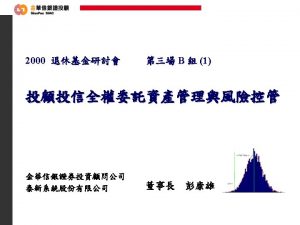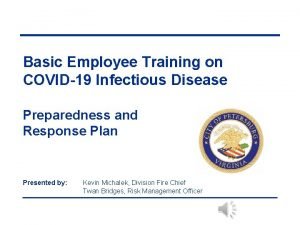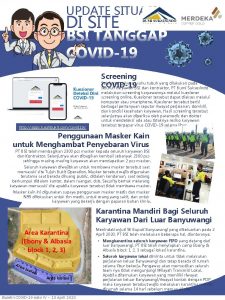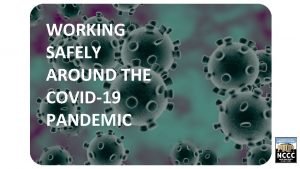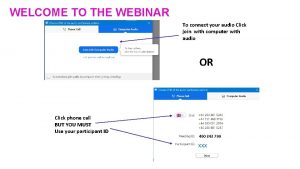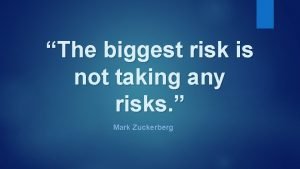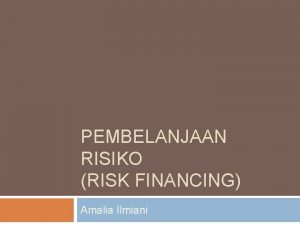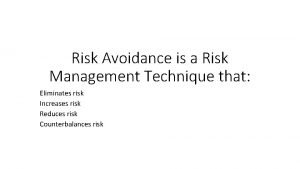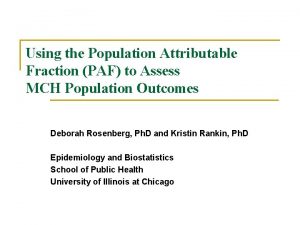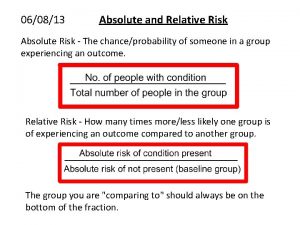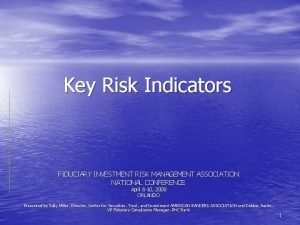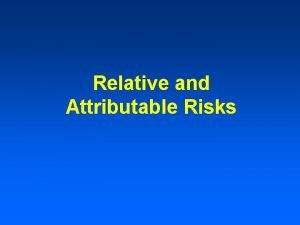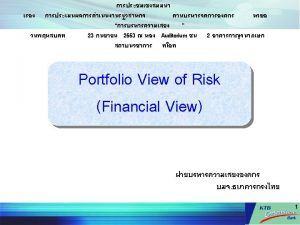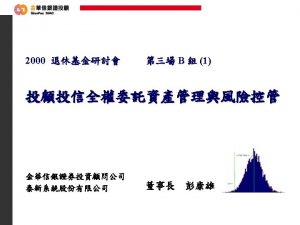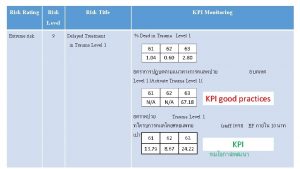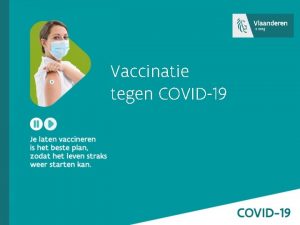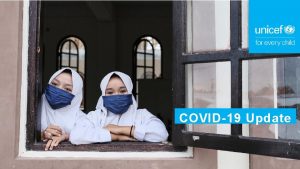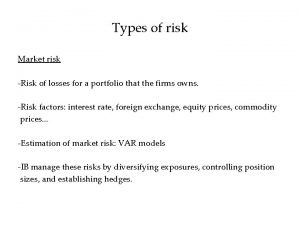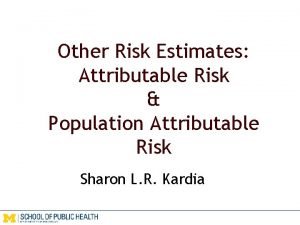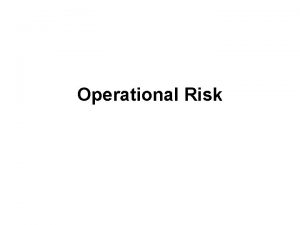What is COVID19 Who is at risk COVID19














- Slides: 14


What is COVID-19? Who is at risk? COVID-19 is a new illness caused by a virus called coronavirus. It can affect your lungs and airways. It is spread through droplets from the nose and mouth- example by talking loud, singing, shouting, coughing or sneezing. Droplets containing the virus can also fall onto surfaces. If you touch that surface and then touch your eyes, nose or mouth, you could also become infected. Coronavirus (COVID-19) can affect anybody. For some people however, the risk is much higher. There are 2 levels of higher risk: • high risk • very high risk

COVID-19 Symptoms If you have any common symptoms of coronavirus (COVID-19), self-isolate and phone your GP straight away (or out of hours GP service- evenings/weekends) to get referred for a coronavirus test Common symptoms of coronavirus include: • Fever (high temperature - 38 degrees Celsius or above) • Cough - any type of cough, not just dry • Shortness of breath or breathing difficulties • Loss or change to your sense of smell or taste Video: https: //www. youtube. com/watch? v=n. Pfi. M 42 MRzc

Simple steps that can slow the virus down https: //youtu. be/ 1 j. Zo. WIWs. EU 8

Face Coverings By law, you have to wear a face covering: • on public transport • in shops, shopping centres and some other indoor settings You should also wear a face covering: • when staying 2 metres apart from people is difficult • in a healthcare setting - this includes hospitals, GP surgeries, care settings, nursing homes and dental practices • when visiting anyone who is more at risk from coronavirus - such as people aged 70 or over or people who are medically vulnerable • Some people do not have to wear face coverings • Who should not wear one

Face Covering Guidelines A cloth face covering should cover the nose and mouth and go under the chin: • fit snugly but comfortably against the side of the face • be secured with ties or ear loops • include at least 2 layers of fabric • allow for breathing without restriction How to wash one • Wash daily in a hot wash at 60 degrees with detergent • You do not need to sterilise face coverings. Wash it in a washing machine or by hand as you would any other item of clothing • Wash your hands before and after use Video: https: //youtu. be/OBR 0 udo. Iai. Y

Disposable Face Masks These masks are single use only Putting On • Wash or sanitise your hands to avoid contamination • Cover your nose and mouth with the mask and pinch the metal strip to secure it over the bridge of your nose • Position the ear loops around your ears and ensure the mask covers the nose, mouth and entire chin Taking Off • Do not touch the outside of the mask while removing it as it may be contaminated • Remove the mask by the ear loops. • Place the mask in a bin after removal • Wash or sanitise your hands after removing the mask


Wash your hands well and often to avoid contamination How to wash your hands https: //youtu. be/Isg. Liv. AD 2 FE

Watch your distance - Maintain the 2 metre rule

Download the COVID Tracker app Download the HSE COVID Tracker app at https: //www. covidtracker. ie The app alerts you if you have been in contact with another app user who has tested positive for COVID-19.

Common questions What should I do if I have been in close contact/live with someone with COVID-19? • Contact your GP and follow HSE guidelines https: //www 2. hse. ie/coronavirus/ Is there a vaccine to prevent COVID-19? • There is currently no vaccine available to protect against COVID-19 (Coronavirus). Will antibiotics help if I get COVID-19? • No. COVID-19 is a viral illness. Antibiotics do not work on viral illnesses. Can COVID-19 be sexually transmitted? • COVID-19 is not a sexually transmitted infection, however, it can be passed on through kissing and close contact, including having sex. Avoid sexual activity and especially kissing if you or your partner has symptoms of coronavirus, such as fever, cough, shortness of breath or loss of smell or taste.

Reliable Information COVID-19 Always use reputable websites for information on COVID-19 Visit the HSE, HPSC and GOV. ie websites • HSE: https: //www 2. hse. ie/coronavirus/ • HPSC: https: //www. hpsc. ie/a-z/respiratory/coronavirus/novelcoronavirus/ • Gov. ie: https: //www. gov. ie/en/campaigns/c 36 c 85 -covid-19 -coronavirus/

Test your knowledge • 1) What are the most common symptoms of COVID-19? • 2) How is COVID-19 spread? • 3) What should you do if you develop symptoms of COVID-19? • 4) Who is most at risk if they develop COVID-19? • 5) List 3 ways you can help prevent the spread of COVID-19 • 6) How often should you wash your cloth face covering? • 7) Why is it important not to reuse a disposable face mask? • 8) When/how often should you wash your hands? • 9) How long should you spend washing your hands? • 10) What is the required social distance to be maintained?
 Credit risk market risk operational risk
Credit risk market risk operational risk What do if test positive covid19
What do if test positive covid19 Http://apps.tujuhbukit.com/covid19/
Http://apps.tujuhbukit.com/covid19/ Vaksin covid19
Vaksin covid19 Do if you covid19
Do if you covid19 Covid19 athome rapid what know
Covid19 athome rapid what know The biggest risk is not taking any risk
The biggest risk is not taking any risk Risk financing adalah
Risk financing adalah Avoidance risk
Avoidance risk Attributable risk formula
Attributable risk formula Absolute risk vs relative risk
Absolute risk vs relative risk Fiduciary investment risk management association
Fiduciary investment risk management association How to calculate relative risk
How to calculate relative risk Risk map risk management
Risk map risk management Activity sheet 2: stock market calculations
Activity sheet 2: stock market calculations
